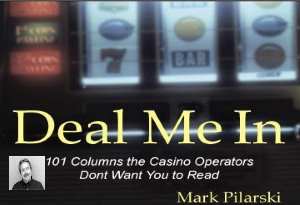I was recently at a casino in Las Vegas and cashed out my winnings at the cashier’s cage. Upon giving the cashier my chips, my cell phone rang and so I answered it not paying attention to the cashier counting out my money. I got to my car and realized that the cashier did not give me the right amount. I returned to the cashier’s cage and asked to speak to a manager because the person I went to was gone. After waiting for 15 to 20 minutes he came back and said that he watched the transaction on video and said that the cashier gave me $1,100, and I disputed with him saying that was not true. I took $1,100 in chips to the counter and when I counted my money in the car I only had $400.
So he calls the Gaming Commission and upon explaining my situation to the Gaming Commission employee I was told that they would review the transaction and let me know the outcome and this should only take about 10 to 15 minutes. I waited for an hour and then the Gaming Commission comes back and tells me that I was given $1,225 I asked to review the transaction myself and I was told that I could not see it. I do not know what I should do to get the money that I won. Could you please point me in the right direction if possible? Lamond H.
By already having the Gaming Commission weigh in, Lamond, you’re probably not going to climb the ladder any higher than you did. As for letting you review the tape, they just don’t, due to their need not to reveal how they do what they do, (exception: the tape could be entered as evidence in a civil trial).
So what did both the cage manager and the gaming agent’s prying eyes see? Well, for starters, know that the essence of casino security is the extensive use of closed circuit television (CCTV), and there are probably more eye-in-the-sky views of the cashier’s cage than of anything else in the casino, thanks to those ceiling-mounted, dome-shaped enclosures with each camera able to be panned up to 360 degrees.
The main function of those cameras is the production of film records, documenting the assets of the casino in areas that are cash-sensitive, or where large dollar amounts change hands, e.g. a huge slot payoff. Those areas include the cashier cage, the pit, the slot drop, etc.
But even with cameras rolling and a surveillance operator doing the watching, that’s not to say a rogue employee didn’t pocket the difference. Because there is that dastardly desire in the poison heart of some individuals to rip off others, employee theft does happen in a casino. But in your case, the theft would most definitely have been on camera, with no second chances for the employee. If detected, he or she would have been canned immediately, with possible confiscation of their Sheriff’s card, and the offender would have a tough time finding another job in the industry.
Outside of looking into every nook and cranny of your wallet, your car key pocket, glove box, sun visor ledge (You know what I mean — where you would put a stash of winnings to hide it from your significant other), I can’t explain the discrepancy of $400 in your pocket, $1,100 you claim you won, and $1,225 an employee of the Gaming Commission said you were paid. What was missing from your e-mail was the willingness of the casino to count down the drawer to see if there was an overage. They do it anyway at the end of every shift, and you could have at least got an accounting of its result.
It’s up to you to decide how long and far you feel like chasing down your lost winnings. You can always find a lawyer, working out of his car to keep the overhead down, to take up your fight, but for now I offer you a lesson learned, that being it is your responsibility if destiny favors you to count and verify full payment when cashing out, and of course, a sympathetic pat on the back.
Gambling Wisdom of the Week: “The mantra “SLOW DOWN” fits just about every game, and should be applied by just about every gambler.” –Frank Scoblete, 109 Ways to Beat the Casinos




















